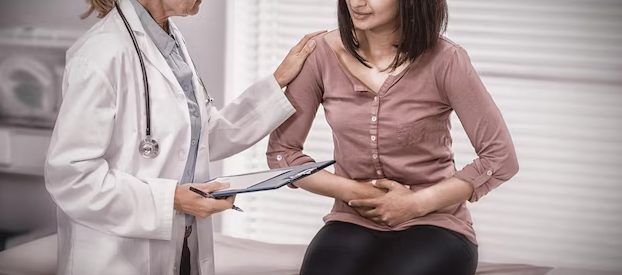
We all experience tummy troubles from time to time. Many times, it is a result of something we ate. But in some cases, the stomach discomfort might be related to a digestive issue. In fact, according to the American Nutrition Association, more than 70 million people living in the United States will experience some type of digestive issue in their lifetime.
Here are the top ten digestive issues that could require immediate medical care.
#1 – Irritable Bowel Syndrome (IBS)
Called IBS for short, irritable bowel syndrome is associated with a nagging pain in the stomach that occurs at least three times a month for three consecutive months. The exact cause of IBS is not clear, but about 15 million Americans suffer from this digestive issue, which can also lead to constipation or diarrhea. Treatment usually involves a change in diet. Consult a doctor if you experience severe abdominal pain or cramps.
#2 – Gastroesophageal Reflux Disease (GERD)
About 20 percent of Americans suffer from GERD. This digestive issue occurs when stomach acid leaks back up into your esophagus. The result is heartburn or acid reflux. If you suffer from these issues on a regular basis, you may have GERD. A trip to the urgent care can diagnose the issue quickly. Treatment usually involves lifestyle and dietary changes. A prescription for a strong acid blocker can also improve the symptoms.
#3 – Celiac Disease and Gluten Sensitivity
Gluten – a protein in wheat, barley, and rye, can cause diarrhea, bloating, and stomach pain. About five percent of Americans have a sensitivity to gluten. However, for about one percent of the U.S. population, gluten is basically poison. This group is considered to have celiac, an autoimmune disease that can damage the small intestine. It is critical to see a doctor to get a proper diagnosis.
#4 – Peptic Ulcer Disease (PUD) and Gastritis
Tummy troubles such as stomach pain and nausea could be the result of one of these two conditions, which involve the lining of the stomach. PUD is an open sore in the stomach lining. Gastritis is an inflammation of the stomach lining. A bacterial infection is usually the most common cause of these conditions. However, overuse of over-the-counter pain relievers such as ibuprofen and aspirin can also contribute to the problem. A physician can prescribe the best course of treatment — whether it be antibiotics, antacids, or proton pump inhibitors.
#5 – Constipation
If you don’t eat enough fiber or drink enough water, you could find yourself backed up with your bowel movements. Three or fewer bowel movements a week is a sign of constipation. Treatment for this condition usually includes an increase in fiber intake and surprisingly, exercise. Exercise increases muscle activity in the intestines. Laxatives and other stimulants can also help move things along.
#6 – Hemorrhoids
This common digestive condition impacts about 75 percent of Americans over 45. Hemorrhoids are swollen blood vessels in the anal canal that can cause pain, itching, and bleeding after a bowel movement. Constipation is the most common cause of hemorrhoids. Special creams, suppositories, and bath soaks can relieve some of the discomfort. If the condition persists, it would be a good idea to discuss it with a physician.
#7 – Small Intestinal Bacterial Overgrowth (SIBO)
Sometimes bacteria in the large intestine can find their way to the small intestine. This is called SIBO. Symptoms include bloating, diarrhea, and constipation. A condition such as this usually needs a doctor’s visit to obtain a proper diagnosis. SIBO is treated with a combination of antibiotics and digestive medications.
#8 – Gallstones
Another cause of tummy trouble can be gallstones. These are small stones that form in the gallbladder, the sac that stores bile for the body to use during digestion. In most cases, gallstones don’t cause any symptoms. However, if the stones are in the opening of the gallbladder, it can cause a persistent pain on the right side of the body, nausea, vomiting, fever, and sweats. Treatment of gallstones sometimes involves surgical removal of the gallbladder.
#9 – Crohn’s Disease
Crohn’s disease is a serious autoimmune disease that requires a doctor’s care. It causes chronic inflammation in the GI tract. Common symptoms of Crohn’s disease include chronic diarrhea, stomach pain, bloody stools, and weight loss. People who suffer from Crohn’s disease usually require medication to reduce the inflammation. A specialized diet is also suggested to control flareups. Some people may also need to undergo surgery.
#10 – Ulcerative Colitis
UC for short, ulcerative colitis causes inflammation in the rectum and large intestine. Ongoing diarrhea, weight loss, fatigue, and stomach pain are the main symptoms of UC. Physicians could suggest a change in diet, as well as medication to manage the symptoms, inflammation, and flareups.
When to Seek Help?
As you can see, most of these digestive issues share some common symptoms. Self-diagnosis is not recommended. Any time you experience symptoms that are not normal for you, you should seek medical advice to get a diagnosis, so you can start treatment and ease your discomfort quickly.
The healthcare team at American Family Care (AFC) is ready to help you with all your medical needs, including any tummy troubles. Visit an AFC urgent care near you today for a medical examination and treatment plan. We are open seven days a week with extended hours. No appointment is necessary.
